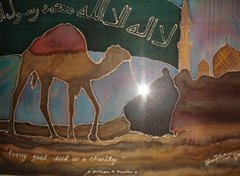
HADITH-15
Abu Hurairah, radiyallahu 'anhu, reported that the Messenger of Allah, sallallahu 'alayhi wasallam, said:
"Let whosoever believes in Allah and in the Last Day either speak good or be silent. Let whosoever believes in Allah and in the Last Day honour his neighbour. Let whosoever believes in Allah and in the Last Day honour his guest."
[Al-Bukhari & Muslim]
Background
This hadith contains the rulings concerning the tongue and the behaviour of Muslims towards others. It also emphasises that we are responsible for what we say.
Imam Haithami points out that this hadith is very similar in meaning to Hadith 13 that says: "None of you truly believes until he loves for his brother what he loves for himself." He says that everyone is a neighbour to someone else. Therefore if this hadith is properly practiced and applied, then there will be a strong bond and love within the society or community.
Lessons
The responsibility of the Muslim regarding what he says is mentioned in the Qur'an:
"Not a word does he utter but there is a watcher by him ready to record it"[Surah Qaf (50): ayat 18].
There are also other hadiths which state that the Muslim should be careful about what he says. His words can either, if they are pleasing to Allah, raise him to a higher level; or if his words displease Allah, they may cause him to be thrown into the Hellfire - as stated in a hadith recorded by Imam al-Bukhari. This shows that what we say can have a direct effect on whether it will benefit us or not.
One hadith (which illustrates the example of a bad consequence resulting from what a person says) states that the Prophet, sallallahu 'alayhi wasallam, said that a pious man from Bani Israel use to see his fellow man always committing sins. On day the pious man swore to the sinner: "By Allah, He will never forgive you." Allah was displeased with what the pious man said because only Allah knows what is our destiny, whether someone will end up in Paradise or Hell. Because of this, when the two men died, the pious man was punished and put into Hell and the sinner was forgiven by Allah. [Sunan Abu Daud]
What we can learn here is that either we say something beneficial and good or else we should keep silent.
There are many Islamic guidelines which help us to say good things and to refrain from saying bad things, or things which displeases Allah subhana wa ta'ala. When we talk to others, whether it is relatives, friends, neighbours, etc., we should select the best terms/words and say them in a nice way. We should ensure that what we say is clear and easily understood. If we are not careful and we do not choose the right words, what we say may be misinterpreted and may lead to conflicts.
As a listener, we have to listen positively and interpret what we hear in a good way. We should not 'over interpret' what we hear; we should not try to 'read between the lines'. Thus, as a speaker we say things in a positive manner and as a listener we interpret things in a positive manner. By doing so Islam encourages us to minimise disputes and conflicts.
If we find ourselves in the middle of a dispute between two people, e.g. between relatives, we should not take sides. We should try to help and reconcile the differences; try to resolve the problems and end the dispute.
If we are being consulted by someone and asked for our advice, we should try our best to give good advice. What we say should help the person and not add to his confusion or doubt. If we do not have enough knowledge and we cannot provide proper advice, then we should keep silent.
Even if we have information which, as a result, may add to the person's confusion, we should keep it to ourselves.
We should keep away as best as we can from unnecessary or non-beneficial talk. People can talk or chat for hours but a lot of what is said is unimportant or trivial and does not benefit anyone. It wastes our time and this continuous talking may even lead us into areas where we might say something which displeases Allah subhana wa ta'ala.
When it comes to saying good things, there are many examples available: dzikrullah (remembrance of Allah), reciting the Qur'an, du'a, giving advice, etc. These are all things which are pleasing to Allah.
When we meet people who are sick, sad, feeling down, in a low frame of mind, etc., we should say things that will make these people feel better, have patience in facing their calamity, be positive, be strong, etc. This is known as al-muasah - to say good things of encouragement to help those facing problems; to not make them panic. The scholars have defined sabr (patience) as 'to refrain from panicking' - to refrain from being out of control - and to refrain the tongue from complaining.
Complaining, e.g. simply saying that the weather is hot, will lead us to impatience; it can affect our attitude and hence our work. If we want to lament we should lament only with Allah. If we do it with Allah it is munajah - it will turn into ibadah. If we do it with others it will be complaining (tashakki) - we will be violating the ibadah itself, which is sabr. So we should learn to minimise and ultimately eliminate the act of complaining.
We should refrain from saying bad things or things which may be untrue. When we hear some news, we shouldn't simply repeat it or spread it without first verifying if the news is true. This could lead to us spreading lies or rumours. We must refrain from:
spreading rumours, especially those that will cause harm to the community.
slandering, back-biting, etc.
sarcasm and making fun of others - this is one of the most common social ills today. It is a sin to make fun of others.
Sometimes we may encounter a situation which involves fitnah or al-fitan. We have to be careful of what we say. There are people who will take advantage of the situation and they may say things which may worsen the situation. When there is fitnah, people are in a panic and might believe anything. That's why we have to be careful of what we say because it may add to the people's fears and problems. What we should do is to help by saying positive things that will give the people hope; to uplift them and motivate them to face the problems; and not to make it worse.
The second part of this hadith stresses on being courteous and generous to our neighbours and guests. This is stated in the Qur'an - Surah An-Nisa'(4): ayat 36: "…do good to parents, relatives, orphans, the poor, the neighbour who is near of kin, the neighbour who is a stranger, the companion by your side, the wayfarer (you meet), and those (slaves) whom your right hand possess."
In one hadith, the Prophet, sallallahu 'alayhi wasallam, said: "Jibril kept advising me concerning the neighbour to the point that I thought that he would inherit from his neighbour." [Al-Bukhari and Muslim]. In another hadith [also recorded by Al-Bukhari and Muslim], it is stated:
"Whoever believes in Allah and the Last Day should not harm his neighbour."
Another hadith records the Prophet, sallallahu 'alayhi wasallam, as saying that the person who does not have complete faith (iman) is the one from whose affairs the neighbour is not safe. Al-Bukhari and Muslim also records another hadith which states that when you cook stew, you should add a little bit more water and give some to your neighbours. This sharing of food between neighbours can strengthen the relationships between them. We should be nice to our neighbours and share our food even if they are not Muslims.
We should be patient with our neighbour even if he causes annoyance to us. In a hadith, the Prophet, sallallahu 'alayhi wasallam, said that there are three types of people whom Allah loves. One of them is a person who has a neighbour who causes him harm or annoyance but he remains patient and tolerates the neighbour.
The 'guest' mentioned in the last part of the hadith is generally interpreted as a travelling visitor who has come to stay for a short while. One hadith states: "Whoever believes in Allah and the Last Day should be generous to his guest. His special gift (to the guest) is one day and night. He (the guest) is to be entertained for three days. Whatever is beyond that is an act of charity. It is not lawful for a guest to stay with his host to the extent that he makes things difficult for him (the host)." [Al-Bukhari]. Thus, the visitor should not take advantage of a generous host.
Regarding this ruling, the majority of the scholars are of the opinion that hosting, in general, is recommended (mustahab) and not obligatory (wajib), even though it is a great and noble act. According to many scholars, the recommended act of hosting does not extend to evildoers or heretics. But some great scholars of today say that we should entertain even evildoers. This is because if we are good Muslims, when we host them and be good to them, we might influence them and cause them to change and become better people. But we should be very cautious if we were to host these sorts of people - we should only do so if we know there will not be any harm that may be inflicted on us.
Hosting evildoers would be following a general principle of Fiqh which allows us to tolerate a minor harm (e.g. allowing an evildoer to stay with us) in order to attain a major benefit (e.g. influencing him into becoming a good Muslim).
Conclusion
This hadith teaches us the proper manners pertaining to speech and entertaining guests. Following the advice given by the Prophet, sallallahu 'alayhi wasallam, will lead to a more peaceful life and harmonious Islamic society in this life, and attaining the pleasure of Allah in the Hereafter
Source: (Jazak Allahu Khairan)













